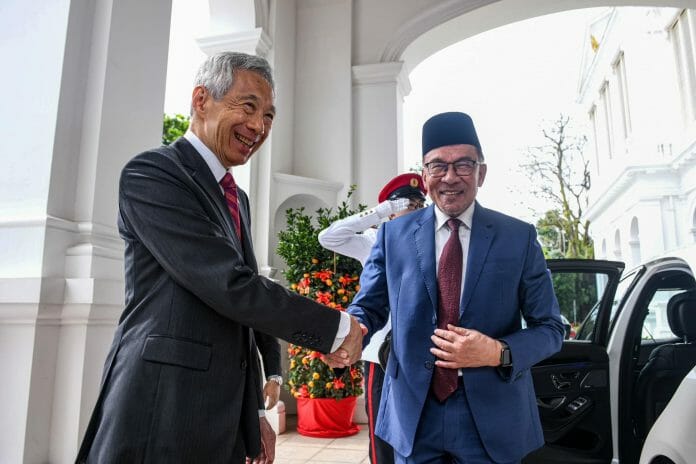Singapore and Malaysia signed three agreements on Monday (Jan 30), covering areas that include digital economy and green economy cooperation.
The two countries also inked a memorandum of understanding (MOU) that will enable them to cooperate on issues such as personal data protection as well as cybersecurity. The agreement was between Singapore’s Ministry of Communications and Information and Malaysia’s Ministry of Communications and Digital.
The framework of cooperation in digital economy covers areas such as trade facilitation, cross-border data flows and electronic payments.
The framework on green economy cooperation will look into the development of new and renewable energy-related technology standards and explore collaboration on electric vehicles and autonomous vehicles standards, among others.
They were signed between Singapore’s Ministry of Trade and Industry and Malaysia’s Ministry of International Trade and Industry.
Singapore Prime Minister Lee Hsien Loong congratulated new Malaysian PM Datuk Seri Anwar Ibrahim, saying both countries should work together to face challenges
The signing of the two frameworks of cooperation, as well as the memorandum of understanding took place as Malaysian Prime Minister Anwar Ibrahim made an official one-day visit to Singapore – his first in his current capacity.
Prime Minister Lee and Anwar witnessed the signing of the agreements at the Istana, CNA cited.
Green Economy
Negotiations on the green economy and digital economy framework agreements were concluded in August last year, when Singapore’s Trade and Industry Minister Gan Kim Yong met his then-counterpart Azmin Ali in Singapore.
The green economy framework agreement is Malaysia’s first green economy agreement signed with any country, MTI said in a factsheet issued on Monday.
It will allow knowledge sharing and business networking for businesses from both countries to learn about sustainable business practices and explore working together.
The two countries will work together on the setting of standards and the deployment of charging points for electric vehicles.
They will also exchange information on low-carbon solutions, including on technical and regulatory issues, and explore joint studies and demonstration projects, particularly in hydrogen and carbon capture, utilisation and storage (CCUS).
Singapore has committed to achieving net zero emissions by 2050, and is currently studying potential CCUS pathways to reduce its carbon emissions.
Malaysia’s previous administration said the country aims to be carbon neutral by 2050 at the earliest and pledged to overhaul its energy, transportation as well as land use sectors.
CCUS can reduce emissions by capturing and converting carbon dioxide in power plants and industrial emissions of power plants into useful products like building materials and reclamation sand.
The two countries will also exchange information on the development of new and renewable energy-related technology standards.
This could support regional decarbonisation, including the possibility of developing common policies and standards for new and renewable energy technologies, MTI said.
Digital Economy
The digital economy agreement will help unlock growth opportunities and benefit both countries’ businesses, workers and communities, MTI said, adding that it will go beyond what is in the Comprehensive and Progressive Agreement for Trans-Pacific Partnership and the Regional Comprehensive Economic Partnership.
Singapore and Malaysia are both signatories to those existing agreements.
MTI on Monday said the new digital economy agreement could serve as a “pathfinder” for digital economy cooperation within the Association of Southeast Asian Nations (ASEAN).
The agreement will support the development of efficient, safe and secure cross-border e-payments systems, working towards an ASEAN network of linked, real-time payment systems.
Singapore’s PayNow and Malaysia’s DuitNow e-payment systems are currently being linked, allowing customers of participating financial institutions to make real-time funds transfers between the two countries using mobile numbers.
The agreement will also help both countries develop and interoperate their respective digital identity regimes for both people and businesses, and covers efforts to support the development of an ASEAN Unique Business Identification Number (UBIN).
This includes a possible bilateral pilot on corporate digital identities, as a proof-of-concept for the UBIN system, MTI said.
The countries will also collaborate in mutually beneficial programmes that facilitate investments in digitalisation, including in partnership with private sector stakeholders.
Personal Data Protection
The MOU on personal data protection, cybersecurity and digital economy will allow knowledge sharing in areas like data protection policies and cross-border data flows, Singapore’s MCI said on Monday.
It will also address “common cybersecurity threats and emerging technologies” like artificial intelligence and distributed ledger technology, MCI said.
The latter refers to the blockchain, or a type of database that is decentralised in nature, eliminating the need for an intermediary to process, validate or authenticate transactions.
During his one-day visit to Singapore, Anwar was accompanied by his wife, Dr Wan Azizah Wan Ismail, Malaysia’s Minister of Foreign Affairs Zambry Abdul Kadir, Minister of Transport Anthony Loke, Minister of International Trade and Industry Tengku Zafrul Aziz, Minister of Communications and Digital Fahmi Fadzil, Premier of Sarawak Abang Haji Abdul Rahman Zohari, and Johor Menteri Besar Onn Hafiz Ghazi.









